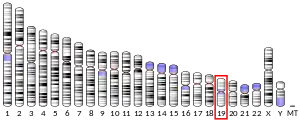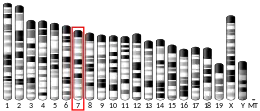KCNK6
Potassium channel subfamily K member 6 is a protein that in humans is encoded by the KCNK6 gene.[5][6][7][8]
This gene encodes K2P6.1, one of the members of the superfamily of potassium channel proteins containing two pore-forming P domains. K2P6.1, considered an open rectifier, is widely expressed. It is stimulated by arachidonic acid, and inhibited by internal acidification and volatile anaesthetics.[8]
See also
References
- GRCh38: Ensembl release 89: ENSG00000099337 - Ensembl, May 2017
- GRCm38: Ensembl release 89: ENSMUSG00000046410 - Ensembl, May 2017
- "Human PubMed Reference:". National Center for Biotechnology Information, U.S. National Library of Medicine.
- "Mouse PubMed Reference:". National Center for Biotechnology Information, U.S. National Library of Medicine.
- Chavez RA, Gray AT, Zhao BB, Kindler CH, Mazurek MJ, Mehta Y, Forsayeth JR, Yost CS (Apr 1999). "TWIK-2, a new weak inward rectifying member of the tandem pore domain potassium channel family". J Biol Chem. 274 (12): 7887–92. doi:10.1074/jbc.274.12.7887. PMID 10075682.
- Gray AT, Kindler CH, Sampson ER, Yost CS (Jul 1999). "Assignment of KCNK6 encoding the human weak inward rectifier potassium channel TWIK-2 to chromosome band 19q13.1 by radiation hybrid mapping". Cytogenet Cell Genet. 84 (3–4): 190–1. doi:10.1159/000015255. PMID 10393428. S2CID 84538070.
- Goldstein SA, Bayliss DA, Kim D, Lesage F, Plant LD, Rajan S (Dec 2005). "International Union of Pharmacology. LV. Nomenclature and molecular relationships of two-P potassium channels". Pharmacol Rev. 57 (4): 527–40. doi:10.1124/pr.57.4.12. PMID 16382106. S2CID 7356601.
- "Entrez Gene: KCNK6 potassium channel, subfamily K, member 6".
Further reading
- Goldstein SA, Bockenhauer D, O'Kelly I, Zilberberg N (2001). "Potassium leak channels and the KCNK family of two-P-domain subunits". Nat. Rev. Neurosci. 2 (3): 175–84. doi:10.1038/35058574. PMID 11256078. S2CID 9682396.
- Mahboubi S, Kaufmann JH (1978). "Intramural duodenal hematoma in children. The role of the radiologist in its conservative management". Gastrointestinal Radiology. 1 (2): 167–71. doi:10.1007/BF02256360. PMID 1088718. S2CID 12318832.
- Maruyama K, Sugano S (1994). "Oligo-capping: a simple method to replace the cap structure of eukaryotic mRNAs with oligoribonucleotides". Gene. 138 (1–2): 171–4. doi:10.1016/0378-1119(94)90802-8. PMID 8125298.
- Suzuki Y, Yoshitomo-Nakagawa K, Maruyama K, et al. (1997). "Construction and characterization of a full length-enriched and a 5'-end-enriched cDNA library". Gene. 200 (1–2): 149–56. doi:10.1016/S0378-1119(97)00411-3. PMID 9373149.
- Salinas M, Reyes R, Lesage F, et al. (1999). "Cloning of a new mouse two-P domain channel subunit and a human homologue with a unique pore structure". J. Biol. Chem. 274 (17): 11751–60. doi:10.1074/jbc.274.17.11751. PMID 10206991.
- Pountney DJ, Gulkarov I, Vega-Saenz de Miera E, et al. (1999). "Identification and cloning of TWIK-originated similarity sequence (TOSS): a novel human 2-pore K+ channel principal subunit". FEBS Lett. 450 (3): 191–6. doi:10.1016/S0014-5793(99)00495-0. PMID 10359073. S2CID 42980921.
- Patel AJ, Maingret F, Magnone V, et al. (2000). "TWIK-2, an inactivating 2P domain K+ channel". J. Biol. Chem. 275 (37): 28722–30. doi:10.1074/jbc.M003755200. PMID 10887187.
- Strausberg RL, Feingold EA, Grouse LH, et al. (2003). "Generation and initial analysis of more than 15,000 full-length human and mouse cDNA sequences". Proc. Natl. Acad. Sci. U.S.A. 99 (26): 16899–903. Bibcode:2002PNAS...9916899M. doi:10.1073/pnas.242603899. PMC 139241. PMID 12477932.
- Mhatre AN, Li J, Chen AF, et al. (2004). "Genomic structure, cochlear expression, and mutation screening of KCNK6, a candidate gene for DFNA4". J. Neurosci. Res. 75 (1): 25–31. doi:10.1002/jnr.10839. PMID 14689445. S2CID 19133204.
- Ota T, Suzuki Y, Nishikawa T, et al. (2004). "Complete sequencing and characterization of 21,243 full-length human cDNAs". Nat. Genet. 36 (1): 40–5. doi:10.1038/ng1285. PMID 14702039.
- Gerhard DS, Wagner L, Feingold EA, et al. (2004). "The status, quality, and expansion of the NIH full-length cDNA project: the Mammalian Gene Collection (MGC)". Genome Res. 14 (10B): 2121–7. doi:10.1101/gr.2596504. PMC 528928. PMID 15489334.
External links
- KCNK6+protein,+human at the U.S. National Library of Medicine Medical Subject Headings (MeSH)
This article incorporates text from the United States National Library of Medicine, which is in the public domain.
This article is issued from Wikipedia. The text is licensed under Creative Commons - Attribution - Sharealike. Additional terms may apply for the media files.




